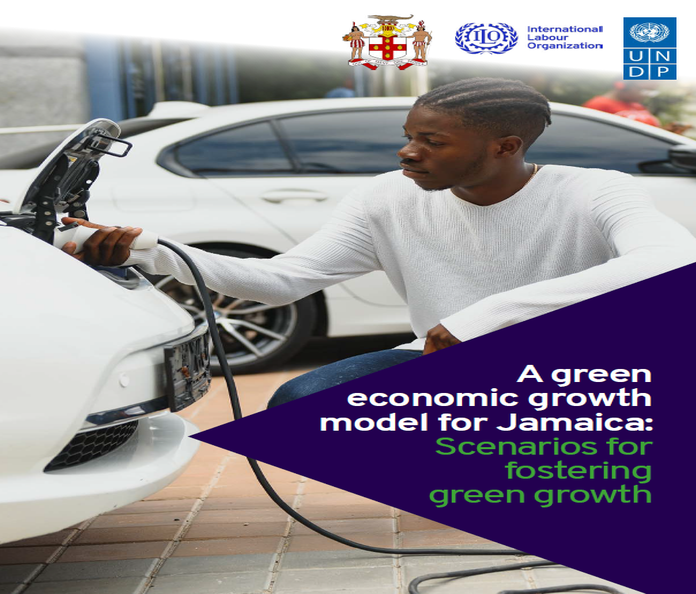 KINGSTON, Jamaica – Jamaica could generate thousands of new jobs and Gross Domestic Product (GDP) growth if the nation transitions to a Green Economic model, says a groundbreaking study supported by the United Nations Development Programme (UNDP) Multi Country Office in Jamaica and the International Labour Organization (ILO) Caribbean Office.
KINGSTON, Jamaica – Jamaica could generate thousands of new jobs and Gross Domestic Product (GDP) growth if the nation transitions to a Green Economic model, says a groundbreaking study supported by the United Nations Development Programme (UNDP) Multi Country Office in Jamaica and the International Labour Organization (ILO) Caribbean Office.
The study, Green Economic Growth Model for Jamaica forecasts up to 8000 new jobs and nearly one percent GDP growth from a Green Economy compared with a business-as-usual economy. Most of the jobs – 3500 estimated – will be needed in service, sales and clerical support, accounting for almost half of the total employment increase,” the report projects.
Officially handed over last week to the Ministry of Economic Growth and Job Creation and the Ministry of Labour and Social Security, the study adds important data to a growing body of evidence guiding Jamaica’s climate ambition.
The study estimates an 11.7 billion JMD increase in investment expenditures, tied to faithful implementation of Jamaica’s Integrated Resource Plan (IRP) and Nationally Determined Contributions (NDC). Imports could also decline by approximately 14.3 billion JM$ in 2037 if Jamaica electrifies road transport leading to decreased demand for liquid transport fuels, the Green Growth model projects.
Increased household disposable income is also anticipated, assuming increasing reliance on sectors using cheaper renewables, including the transport sector. “As a result, by 2037, the total household final consumption is 4.8 billion JM$ or 0.2 percent, higher than the current baseline”, the report forecasts.
UNDP resident representative Dr Kishan Khoday in welcoming the findings said the report provides a timely and critical moment of reflection for Jamaica and other Small Island Developing States which are largely dependent on fossil fuels and extremely vulnerable to climate-induced shocks. “Pursuing a green economic model is not just a strategic choice for Jamaica as a Small Island Developing State (SIDS)—it is an imperative for survival, resilience, and inclusive prosperity,” Dr Khoday added: “a green economic model not only reduces climate vulnerability and exposure but creates new jobs and livelihoods while diversifying the economy. “The Green Economic model is a platform on which countries can reduce reliance on fossil fuels, attract innovative investments and foster community participation and empowerment,” he stated.
Marissa Sheppard, ILO Caribbean Office, Just Transition Officer, said Jamaica now has the tools, partnerships and evidence to lead the way towards a Just Transition, but deliberate action is also needed to ensure that opportunities generated by a Green Economy reach those most in need
“The connection between data and policy action is what will transform this research into real change for working families in Jamaica,” she said. “We have shown with the right partnerships, quality data and commitment to social dialogue, that we can create a future where climate action and decent work go hand in hand”, Sheppard stated.
“Insights from the Green Economy study will help ensure that the transition to a low carbon and climate resilient economy supports decent work, social protection and economic opportunity regardless of gender grouping or vulnerability,” said Omar Alcock, principal director (acting), climate change division, ministry of economic growth and job creation. He said the study, which includes a Green Jobs assessment, can play a critical role in reducing unemployment and promoting social inclusion by promoting non-traditional green jobs.
Alcock said Jamaica must shift its long-term investments from conventional to green alternatives to avoid locking in less efficient carbon intensive technologies for decades to come. “I welcome this study which will undoubtedly provide us with the necessary concrete tools to guide policy decision with the aim of supporting green investments and job,” he stated.
Alrick Brown, Kingston regional director in the ministry of legal and social security representing Gillian Corrodus, chief technical director (acting) said the ministry looks forward to supporting its labour market data collection analysis with data from the Green Economic Growth Model.
“We will need to assess the current talent available in Jamaica, the existing skill gaps and upskilling opportunities for workers. Similarly, public private partnerships will be encouraged to harness the opportunities for the advancement of economic activities in the green economy” he called on ministries, departments and agencies, training institutions and civil society to increase awareness of these opportunities while exploring partnerships to advance the green labour market.
The Green Economic Growth Model was supported under UNDP’s Climate Promise Pledge to Impact Programme, which has supported over 120 countries to enhance and implement Nationally Determined Contributions (NDCs) under the Paris Agreement. From Pledge to Impact is generously supported by the governments of Germany, Japan, United Kingdom, Sweden, Belgium, Spain, Iceland, the Netherlands, Portugal and other UNDP core contributors. This programme underpins UNDP’s contribution to the NDC Partnership.
The study is available here.





